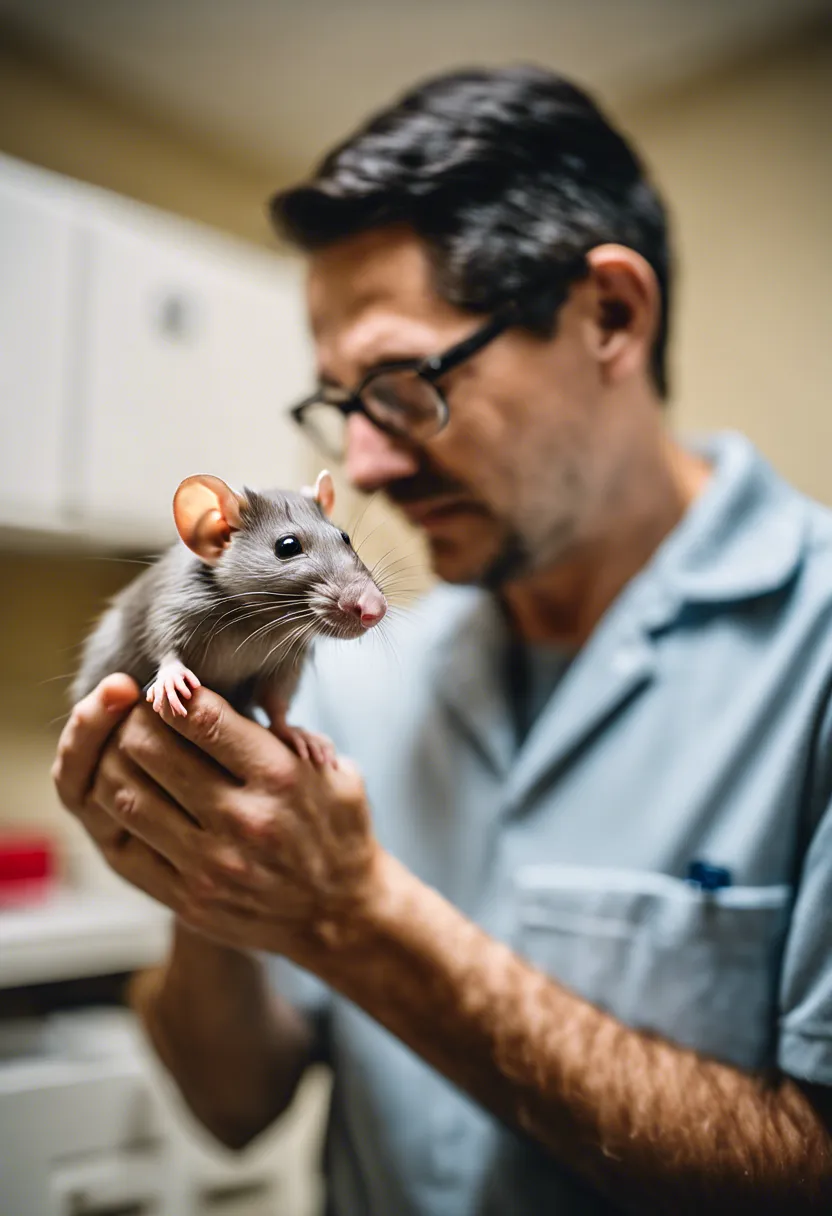Ever looked at your pet rat and wondered, “Is my little buddy feeling okay?” It can be quite the pickle trying to figure out if your adorable rodent pal is a Sick Rat or just having an off day.
In this blog, we’ll explore some common signs that might indicate your rat isn’t feeling too chipper. So buckle up, rat parents! We’re about to dive into the world of rat health. Keep reading about ‘Sick Rat – Is My Rat Ill And What Should I Do?’
Key Takeaways
- Recognize signs of illness in rats such as changes in behavior, appetite, or physical appearance.
- Common rat illnesses include respiratory infections, tumors, and skin parasites.
- Consult a vet if your rat shows signs of illness. Early detection can lead to more effective treatment.
- Maintain a clean habitat and balanced diet to prevent illness.
- Quarantine new rats before introducing them to existing ones to avoid spreading diseases.

Understanding Rat Illnesses
When it comes to our furry friends, knowing the ins and outs of rat health problems is crucial. Recognizing the signs of common rat diseases early on can make all the difference.
Common Illnesses in Rats
Rats are pretty hardy creatures, but they’re not invincible. They can catch a range of illnesses, with respiratory infections in rats being one of the top culprits. These infections can come on quickly and without much warning, making early detection vital for treatment success. Another common issue is various skin conditions in rats, which can cause discomfort and lead to more serious complications if left untreated. The key here is catching these issues early on, which isn’t always as easy as it sounds. But understanding what to look out for can help you get your little buddy the help they need pronto.
| Illness | Symptoms | First Aid |
|---|---|---|
| Respiratory Infections | Sneezing, wheezing, coughing, labored breathing, nasal and eye discharge | Bring to vet immediately. Keep warm and stress-free. |
| Bumblefoot (Ulcerative Pododermatitis) | Swelling or redness on the feet, reluctance to move, limping | Clean feet with antiseptic. Apply topical antibiotic ointment. Consult a vet for severe cases. |
| Mycoplasma Pulmonis | Difficulty in breathing, red or brown discharge from nose and eyes | Bring to vet immediately. Antibiotics may be prescribed. |
| Skin Mites (ectoparasites) | Excessive scratching, hair loss, scabs on skin | Use anti-parasitic medication as directed by a vet. |
| Mammary Tumors | Lumps around the mammary glands under the skin; more common in females | Surgery is often required; consult your vet. |
| Rat Bite Fever | Not directly observable in rats; humans bitten by an infected rat might experience fever, vomiting, headache | Seek medical attention if bitten by a rat. |
| Ringworm (Fungal Infection) | Circular areas of hair loss with red rings on the skin | Topical antifungal creams can be used; bring to a vet for diagnosis and treatment plan. |
| Tyzzers Disease | Diarrhea, lethargy, ruffled fur | Bring your rat to a vet immediately as this disease could be fatal if untreated. |
| Leptospirosis | Lack of appetite, muscle rigidity | Leptospirosis is zoonotic (transmittable to humans). Consult the vet immediately. |
| Malocclusion (overgrown teeth) | Drooling, weight loss, lack of appetite | Regular teeth trimming might be necessary. Consult your vet for advice. |
| Mastitis (Breast Infection) | Swollen, red, hard mammary glands; fever; loss of appetite | Antibiotics and pain relief are usually required. Contact a vet immediately. |
Signs and Symptoms of a Sick Rat
Spotting a sick rat isn’t always straightforward. Sometimes the signs are subtle, like a slight change in their eating habits or a dip in their usual energy levels. If your rat’s chowing down less than usual or seems more lethargic, it could be a sign something’s up.
Then there are more obvious red flags like breathing difficulties or any unusual discharges from their eyes or nose. These symptoms shouldn’t be ignored; they’re your cue to spring into action and consult with a vet who knows their way around rat health problems.
How to Assess Your Rat’s Health?
Knowing if you’ve got a sick rat on your hands starts with some detective work. You gotta play part vet, part Sherlock Holmes.
Physical Examination
When it comes to keeping tabs on your furry friend’s health, a hands-on approach is key. Regularly giving your rat a once-over can help catch those sneaky signs of sickness early. Start by checking for any lumps or bumps that weren’t there before; these could be anything from harmless cysts to something more serious.
Next, take a gander at their fur and skin. You’re looking for bald patches, scabs, or signs of infection that scream “I need attention!” Examining your rat might not be their idea of fun, but it’s crucial for catching issues like rat physical check-up needs or identifying lumps in rats before they turn into big problems.
Behavioral Changes
Rats are usually bustling with energy, so when Mr. Whiskers starts acting more like a couch potato than an acrobat, it’s time to perk up those ears. A sudden drop in activity or changes in eating habits can be big red flags. Maybe they’re not chowing down like usual or they’re hoarding food instead of eating it – both are signs something’s up.
And if your normally sweet-tempered buddy starts getting snippy, consider it a cry for help. Aggression or sudden shyness can also point towards feeling under the weather. Keeping an eye on these rat behavior indicators, like changes in rat appetite or lethargy in rats, helps you stay one step ahead of illnesses lurking around the corner.

What Should I Do If My Rat Is Sick?

When your rat shows signs of illness, it’s crucial to act swiftly. Recognize the sick rat symptoms, consult a vet for any rat health issues, and provide comforting home care for sick rat.
When to Consult a Vet?
Noticing your furry friend isn’t their usual self can be worrying. When you spot any rat illness symptoms like lethargy, sneezing, or unusual lumps, it’s time to seek professional health advice for rats. These signs might seem minor but can escalate quickly in small animals like rats.
Veterinary care for rats is specialized, so finding a vet with experience in treating small pets is key. Some emergency signs in sick rats include difficulty breathing, severe weight loss, or unresponsiveness; these require immediate attention. Timely medical intervention can significantly improve your pet’s chances of recovery.
Home Care for a Sick Rat
While waiting for your vet appointment or after getting professional advice, providing tender loving care at home is essential. Creating a comfortable environment for ill rat involves keeping their living area clean, quiet, and warm since sick rats can get cold easily.
Regarding nutrition, feeding sick rats might require offering soft foods that are easy to eat if they’re showing less interest in their regular diet. Ensuring they stay hydrated is equally important; sometimes gently syringing water can help if they’re not drinking on their own. Lastly, keep a close eye on them – monitoring health of sick rats closely will help you notice any changes in their condition, whether improvement or deterioration, which you should report back to your vet.
Preventing Illness in Rats
Maintaining rat health isn’t just about reacting to illnesses; it’s about preventing them. A bit of foresight into diet, nutrition, and habitat can go a long way in keeping your whiskered friend both happy and healthy.
Proper Diet and Nutrition
When it comes to keeping your rat tip-top, think of their diet as the foundation. Rat diet essentials include a mix of fruits, veggies, and high-quality rat pellets that cover all the nutritional needs of rats. But hey, not everything that’s edible for us is good for them. Foods to avoid for rats? Anything sugary or fatty can turn your sleek furball into a pudgy couch potato with health issues.
A balanced diet for rats isn’t just about avoiding the bad stuff; it’s also about promoting rat health through diet. Think variety but in moderation. Too much fresh food can upset their tiny tummies, so balance is key. Remember, a well-fed rat is a happy rat and far less likely to fall ill.
Hygiene and Habitat Maintenance
Now let’s talk digs – keeping your rat’s home clean is non-negotiable for preventing rat illnesses. Regularly cleaning rat cages isn’t just about odor control; it’s crucial for their overall well-being. A dirty cage can lead to respiratory issues or worse.
But how often is often? Well, spot cleaning daily with a full clean weekly should do the trick. And when you’re doing that full clean-out, consider safe habitats for rats by using pet-safe disinfectants and making sure everything’s dry before your buddy moves back in. Routine habitat maintenance for rats might sound like a chore, but it’s all part of the love pact you signed up for when you decided to bring them home!

To Wrap Up
In the rat race of life, our little pals can also fall ill. We’ve journeyed through the labyrinth of Sick Rat symptoms and care, making us veritable ‘rat doctors’.
Remember, your whiskered friend depends on you for their health. If they’re acting more like a sluggish sloth than a spry squirrel, it’s time to get them checked out. Let’s keep our ratty buddies in tip-top shape!


